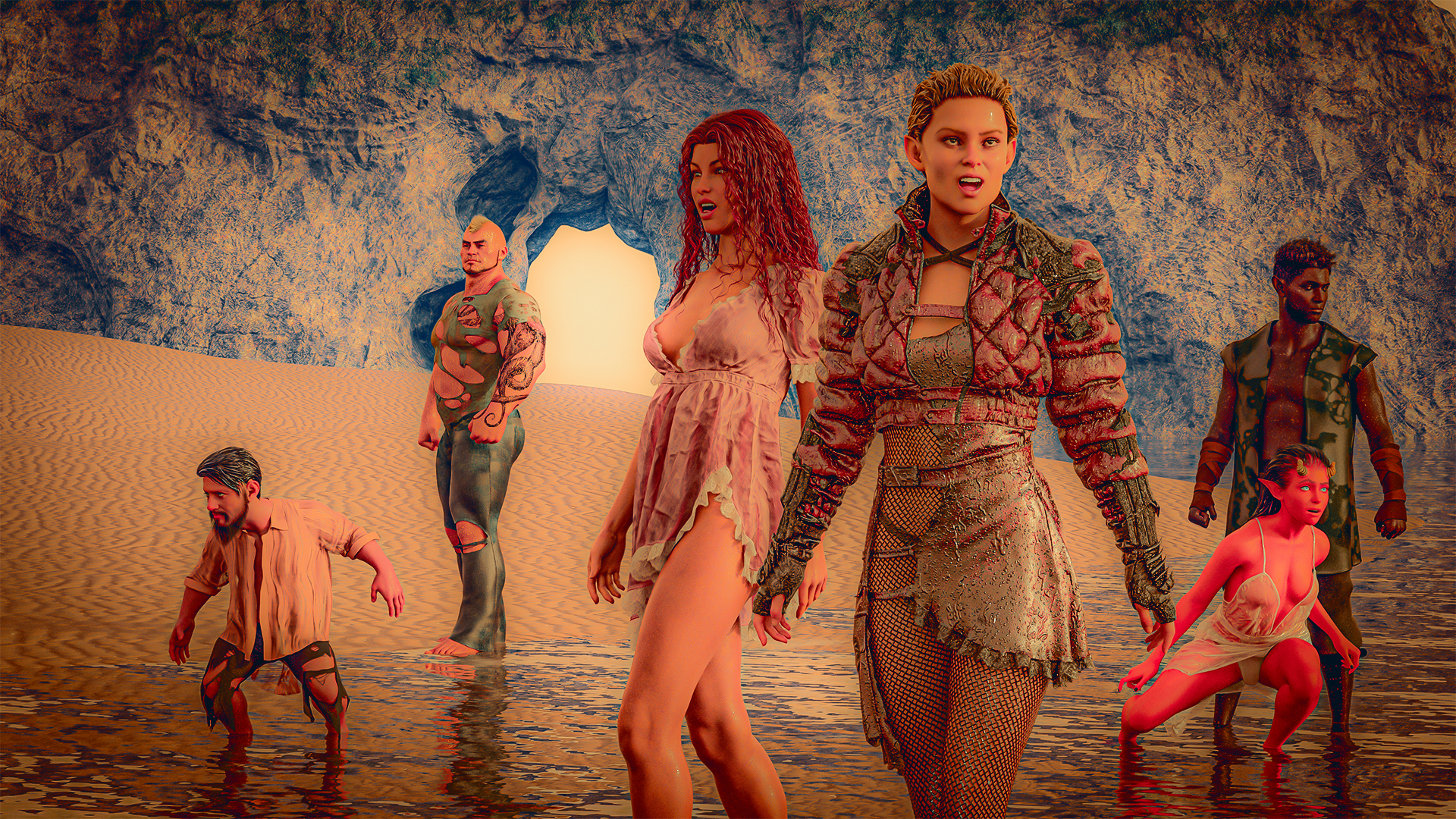Arrival of Refugees in Eden
The Arrival of Refugees in Eden marks the beginning of a new age in this purgatorial paradise. And yet, because this is such a rare event and so different each time it occurs, the traditions and rituals surrounding it have evolved considerably over time.
Constants
At the end of an iteration of reality in the universe outside of Eden, a Calamity rips apart the fabric of creation. The majority of life is destroyed in the process, but a fraction survives and finds themselves washed up along the shores of Eden’s lakes, rivers, and its Sea of Tears.
Variables
First Arrival
At the dawn of the First Age, Eden was teeming with wildlife—and the vegetation necessary to support those species—but it had no sapient beings to speak of. That all changed when swarms of people from across the Earth-665 iteration began appearing along the waterways of the world. There were dwarves and elves, humans and fairies, a shape-shifting species called the kíndalla, winged humanoids called qhirat, real-life yeti, and the species who would eventually come to love Eden more than any other: the halflings.
Soon after this First Arrival, these hearty survivors divided up the world and established its first governments: the United Countries of Oz, the Democratic Republic of the Reek, the Free Cities of Nunya, and the seven kingdoms of the south (Promiseland, Motherland, Yesterland, Fatherland, The Highlands, Neverland, and The Realm).
Eventually, each of the three largest countries—The Reek, Nunya, and Oz—ceded portions of their land to create The Grand Duchy of the Garden in the center of Eden, and it was there that the international organization known as The Council of Five was founded.
The Council did establish loose guidelines for what to do if new refugees arrived, but those guidelines were never necessary. The people in Eden were the only people left in existence—until they gathered the Seven Voices to sing a new iteration of reality back into existence, that is.
Second Arrival
The halflings, dubbed the custodians of Eden by the sister goddesses Phina and Mira, were the only sapient species to remain in paradise beyond the end of the First Age. They had spent 37 years wandering the world before the Second Arrival and many had mixed feelings about having to make room for a new batch of refugees.
That said, most halflings were excited for a chance to reconnect with the culture they had once worked with to save Eden from the Monster Hordes: the human warriors known as the Bekiskapan. The halflings were so excited, in fact, that they missed all the obvious signs that the human beings who came to Eden in the Second Arrival were not Bekiskas at all—despite their claims to the contrary. And by the time the halflings realized they’d been hoodwinked, they had already given dominion over the whole of the South to the duplicitous False Kings.
Non-humans were taken in by The Garden, The Reek, and Nunya, in accordance with the loose guidelines established by The Council of Five in The First Age. Oz was left for the halflings alone—at least initially.
Over in The Reek, the most technologically advanced species—the dwarves among them—were heavily recruited by the Winkie engineers who had dominated the region since Eden’s founding. This solidified the precedent established in The First Age by the Opposition to Cultural Tampering Injunction and made The Reek the de facto tech capital of the world.
Third Arrival
The Third Arrival presented a unique problem for the halflings of Eden, who had spent the 37 years between the end of The Second Age and the start of the third in an unprecedented industrial revolution.
Reality outside of Eden had collapsed in the Earthling year of 1858 this time around, and the refugees—the human beings, in particular—were not at all prepared for the level of technology they found in their new home. Sure, the OCTI initiative kept the most advanced stuff behind the Reekian Wall. And sure, the cities of the south—now united as Wonderland—were so behind the times that they felt fairly familiar to the refugees. But up in Nunya, in Kirbyville and Paradise City, there were still innovations 75 years beyond what most of Eden’s newest residents had ever seen before.
Though some on The Council of Five argued that the old rules for distributing refugees would be good enough—elves in the north, dwarves in the east, etc.—it was eventually decided to implement an interview process to determine the placement of each individual and family. Some minds were less easily blown than others, after all.
And this is how Abraham the Honest, a human who might otherwise have been relegated to the Luddite South, was placed in Nunya instead—where he would go on to become one of the nation’s greatest heroes.
Fourth Arrival
The Fourth Arrival brought refugees from a universe which collapsed at the dawn of Earth’s twenty-first century. And so, technologically speaking, it presented far less of a challenge than The Third Arrival had. The problem of The Fourth Arrival was the sheer number of survivors it brought to Eden’s shores.
The interview process established for The Third Arrival did not scale, and so The Council went back to the drawing board. But before they could come up with a solution, the conditions of the temporary refugee camps were deemed inhumane and nearly all rules regarding immigration and placement were suspended. Every country except for The Reek opened their borders to any and all comers. To get beyond the great Reekian Wall, you still had to pass an audition of sorts.
The Future
To date, The Fourth Arrival was the last in Edenian history. Though the halflings prepared for a Fifth Arrival in 1553 ED, The Calamity which was supposed to happen that year and end the Earth-669 iteration of reality was ultimately avoided.
Rules for a theoretical Fifth Arrival would be loose, avoiding the mess of The Fourth Arrival by allowing unfettered immigration to all countries—with even The Reek having learned its lesson about exclusivity during the disastrous and interminable Fourth Age.









Awesome to get such a detailed overview of the major events in Eden! Great read.
Thank you! Some of this I knew beforehand, but the rest I worked out. Really good to know this in advance of the writing I'm planning for next year.